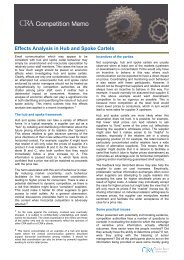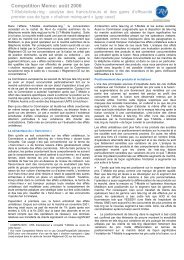CUSTOMER AGREED REMUNERATION - CRA International
CUSTOMER AGREED REMUNERATION - CRA International
CUSTOMER AGREED REMUNERATION - CRA International
Create successful ePaper yourself
Turn your PDF publications into a flip-book with our unique Google optimized e-Paper software.
REPORT BY <strong>CRA</strong> INTERNATIONAL<br />
Figure 18 Method of shopping around<br />
80%<br />
70%<br />
60%<br />
50%<br />
40%<br />
30%<br />
20%<br />
10%<br />
0%<br />
Another adviser Another company Friends Newspapers or<br />
magazines<br />
Internet<br />
Source: <strong>CRA</strong> <strong>International</strong> based on customer survey of 209 purchasers conducted by ORC <strong>International</strong>.<br />
It is clear from Figure 18 that when consumers state that they would shop around, they<br />
are mainly thinking of undertaking comparisons through searching the internet or through<br />
asking friends or family. Currently few intermediaries set out their charges for advice such<br />
that consumers would be able to search for the cost of advice through the internet. It<br />
seems unlikely that this will alter dramatically in the short-term, although over time<br />
details of the cost of advice may be accessible through the internet (indeed this is likely to<br />
occur once intermediaries can benefit from providing such information). Hence, over the<br />
medium-term, if CAR is implemented successfully, additional gains may arise from<br />
comparisons through the internet.<br />
In the short-term, only 20% of those customers who agree that CAR would make them<br />
more likely to shop around (10% of all customers) would do so through comparisons with<br />
another adviser.<br />
Intermediaries were also asked how consumers would change their behaviour and around<br />
27% thought that CAR might lead to shopping around. This is substantially larger than<br />
the proportion of consumers who state that they will shop around by comparing between<br />
different advisers which suggests that using 10% of consumers as the increase in<br />
shopping around based on the consumer survey would be a cautious approach.<br />
In combination, therefore, these results support a modest increase in shopping around.<br />
Provider bias<br />
Second, in terms of bias, CAR should reduce the potential for provider bias. Assuming<br />
that advisers will set the price of their services so that it does not vary by provider, this<br />
could bring benefits of the order of £66 million a year assuming provider bias is<br />
46




